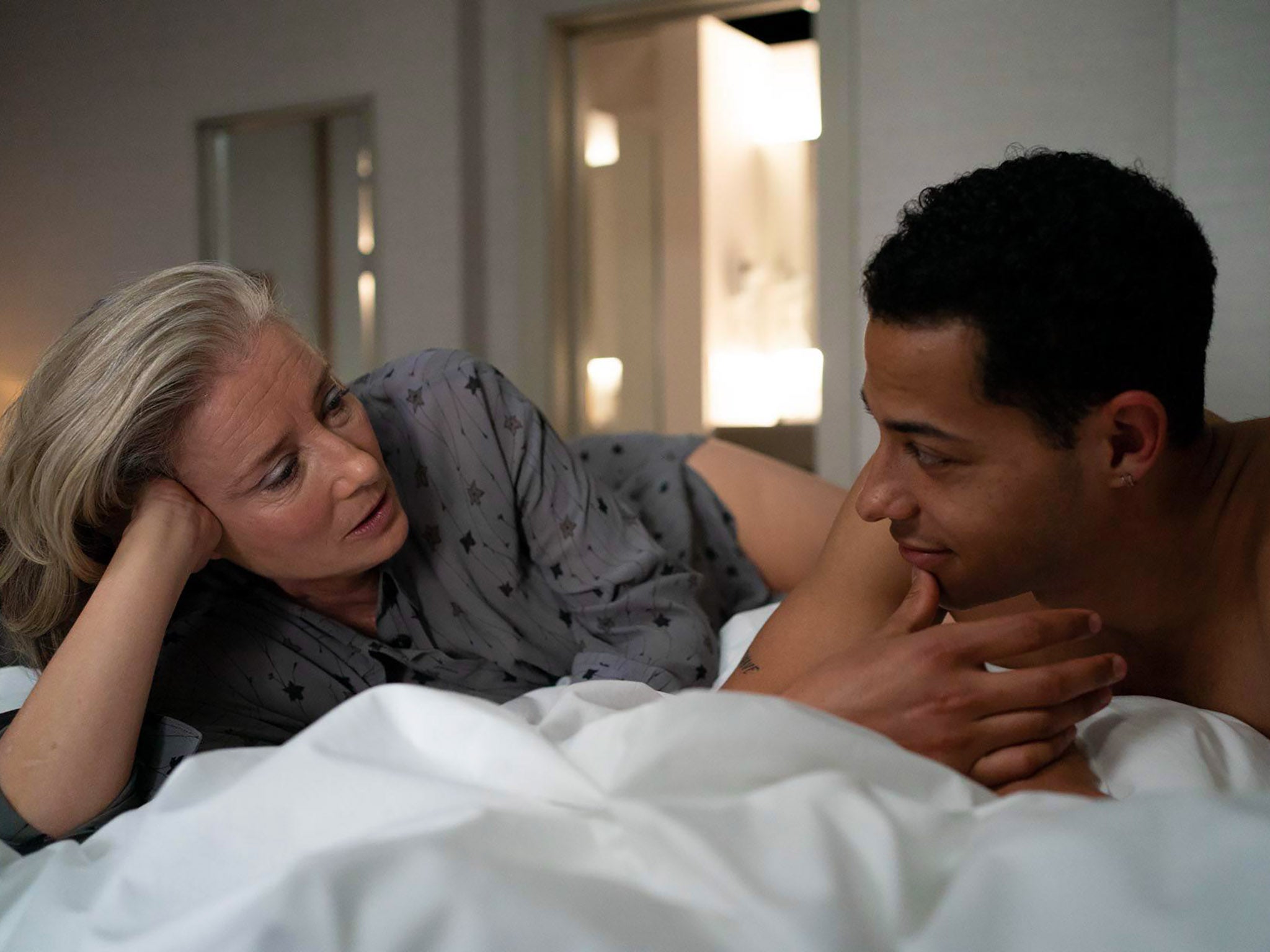The Independent's journalism is supported by our readers. When you purchase through links on our site, we may earn commission.
Good Luck to You, Leo Grande: This is what a sex worker really thinks of intimacy with clients
Dame Emma Thompson and Daryl McCormack’s new film revolves around a powerful intimacy between a sex worker and their client. Kate Ng speaks to sex worker Audrey to find out if this genuine connection is ever replicated in real life


In the new film, Good Luck To You, Leo Grande, sex worker Leo Grande (Daryl McCormack) knocks on the door of a hotel room and is greeted by retired religious school teacher, Nancy Stokes (Dame Emma Thompson). Nancy reveals that her sex life with her late husband was so unfulfilling that she had never experienced an orgasm, and hires Leo in the hope that he can get her there.
At the centre of the film is a powerful intimacy that builds up between Leo and Nancy. Leo listens as Nancy frets about her predisposed assumptions about his sex work, the insecurities she has about her bodies and her skittishness about sex and sensuality. He gets Nancy to relax and open up to him, both physically and emotionally, and reveals to her the “possible sanctity of sex work”, as Thompson wrote in British Vogue.
But genuine intimacy and sex work are not always good bed-fellows. Building an intimate relationship with clients often comes with the risk of someone getting hurt — emotionally, at best, and physically, at worst. Audrey, a 27-year-old sex worker and press officer for sex workers’ rights organisation, United Sex Workers, tells The Independent that the film’s premise is not true for the majority of sex workers, who “simply see this as a job”.
“It’s portrayed as a romantic thing, where Nancy meets this sex worker and they help her feel alive again,” she says. “That made me laugh because it’s coming from such a client-heavy perspective, where you go to this sex worker and unload your troubles and dramas, and then you walk away.
“From the sex worker’s perspective, you’re working. It’s like clocking in for a shift. For us, it’s not this intimate, wonderful experience, you just sit and listen to the client.”
For most sex workers, Audrey says, providing an “illusion or fantasy of intimacy” for clients who want it can be an important part of the job. However, that’s all it is: an illusion. But some clients are unable to stay on the right side of boundaries drawn by sex workers when they feel they have cultivated a relationship of sorts.
From the sex worker’s perspective, you’re working. It’s like clocking in for a shift
“We see clients all the time who often say, going to see a sex worker is like going to therapy. But this isn’t right, we’re not trained therapists and that’s not the service we’re providing,” she says. “Sometimes they let themselves believe in the fantasy. But in reality, they’re doing that because it’s an easier truth to face than admitting they are paying for a service.
“Clients have called me their friend and asked me to meet them outside of sessions or go for a walk — I’d say no. I have a lot of clients who are really lovely people and I don’t mind spending time with them at all — providing I get paid — but I haven’t ever really let myself get that close to a client.”
Fostering an intimate relationship with another person would usually involve exchanging personal information about one another. But for sex workers, revealing details that might seem small to non-sex workers, such as your real name, could open the door to trouble.

While prostitution itself is not illegal in the UK, there are a number of offences linked to it that puts sex workers at risk of harm, either by their clients or by falling foul of the law. For example, more than one sex worker using a property for sex work is considered “brothel-keeping”, even if they are working together as a safety measure.
According to legal guidance by the Crown Prosecution Service, the UK’s prostitution laws are intended to “meet its international legal obligations to discourage the demand for sexual services in support of conventions to suppress and prevent trafficking for sexual exploitation”. However, research by Amnesty International found that sex workers often get no, or very little, protection from abuse or legal redress as criminalisation “enables the police to harass [sex workers] and not prioritise their complaints and safety”.
I’m constantly aware that there is a power dynamic where the client, especially male clients, have more power than me
Audrey says that the continued criminalisation of so many aspects of sex work means sex workers have limited options when it comes to getting help. “For the majority of sex workers, particularly women in the industry, there is an element of danger when dealing with clients we don’t know. We have very limited safety tools at our disposal, such as shared resources we’ve built among ourselves to share information about clients and file reports for each other, but those are the only preventative measures we have to try and figure out if a client is going to be dangerous or not.
“I’m constantly aware that there is a power dynamic where the client, especially male clients, have more power than me. It keeps me on my toes and I can’t really relax into it — even if you know a client, they could still do something like steal your money or possessions and walk out, or become violent.”
While Good Luck To You, Leo Grande does not have to be a film that exposes the dangers sex workers face, Audrey believes it portrays sex workers as “one-dimensional characters who exist only to serve the client’s narrative, who don’t have a voice of their own, who aren’t fully fleshed-out human beings”.

“This film uses a sex worker as a character,” she adds. “Yet it’s exactly this kind of portrayal that quietly stigmatises us. It feeds into that existing stigma which directly impacts our fight for our safety and rights.”
She also criticises Thompson’s involvement in the film. In 2015, the actor was among thousands of people who called on Amnesty International to withdraw a proposal that advocated for the decriminalisation of sex work. Thompson signed an open letter by the Coalition Against Trafficking in Women (CATW) alongside Kate Winslet, Meryl Streep, Lena Dunham, Anne Hathaway, and Emily Blunt.
The coalition argued that legalising sex work would “support gender apartheid”, resulting in “some women in society [being able] to demand protection from rape, discrimination and sexual harassment, while others, the most vulnerable among us, are instead set aside for consumption by men and for the profit of their pimps”.
Like many of my generation, the idea of it being a chosen occupation rather than something awful once has been forced into by poverty or abusive power is very new and takes some getting used to.
However, Amnesty International said that decriminalising consensual sex work, including laws that prohibit associated activities and urged government to refocus laws on making sex workers’ lives safer and improve relationships with the police. The charity published its policy on decriminalising sex work in 2016.
But the film appears to have softened Thompson’s stance on the issue. She admitted in British Vogue this week: “Like many of my generation, the idea of it being a chosen occupation rather than something awful once has been forced into by poverty or abusive power is very new and takes some getting used to.”
She continued: “Largely, I suppose, because of the dangers. It’s all very well to agree upon boundaries, but to be alone in a room with a stronger human who can easily — very easily sometimes - hurt, rape or kill you, is frightening.
“It remains frightening to me, although I also think that under the right circumstances — legal safeguards, decent clients, and so forth — it could be a very good job.”

Audrey says that while she is pleased Thompson appears to be “open to learning more”, she adds: “Whatever the reason someone enters sex work, those workers still need safety and rights. The only way sex work can become less frightening is if they are given more rights, and the only way that can happen is decriminalisation.
“I hope that Emma Thompson is listening to sex workers and what they say on this issue because sex workers are the experts in our own working conditions, because we live them. We aren’t arguing for decriminalisation because we’re invested in the industry; we’re invested in our and our colleagues’ safety.”
The Independent has contacted Thompson’s representatives for comment.
Join our commenting forum
Join thought-provoking conversations, follow other Independent readers and see their replies
Comments
Bookmark popover
Removed from bookmarks